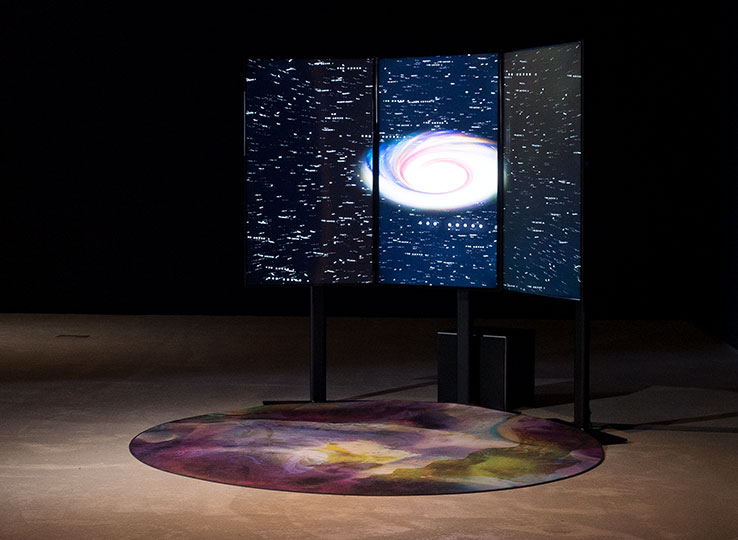Dark Matter and Metaphor: A Panel Discussion on Art and Astrophysics
A program of
Drift: Art and Dark Matter
Wednesday, September 21
6pm–8pm
Online on Zoom
Join us for a panel discussion on the interdisciplinary potentials of astrophysics and art, featuring University of Toronto astrophysicists Renée Hložek, Miriam Diamond, and David Curtin alongside Queen’s University cultural studies scholar Elvira Hufschmid.
Bridging art and science or, indeed, identifying their existing entanglement is no new feat, as any early modern polymath would tell you—yet disciplinary boundaries can still prove difficult to cross, and what such crossings might offer isn’t always readily apparent. Drift: Art and Dark Matter proposes the potentials of collaboration between astrophysicists and artists; itself like a laboratory, the exhibition offers us a site of experiment in which to explore what an expanded perspective might disclose about our universe, and about us, at large. If, after all, dark matter poses a fundamentally sensory problem—evading our comprehension as it escapes our perception—perhaps we could approach it with aesthetic—sensory—solutions.
Pursuing Drift‘s avenues of inquiry by drawing on their own research and experiences across the arts and sciences, Hložek, Diamond, Curtin, and Hufschmid consider the possibilities and implications of Drift’s interdisciplinary undertaking.
We invite your participation in a Q&A period concluding the event.
—
About the Panelists
Renée Hložek, Assistant Professor of Astrophysics at U of T, studies a variety of problems in theoretical and observational cosmology. Her research focuses on understanding what the Universe is made of, its structure and how it is changing with time. Hložek received her DPhil in Astrophysics from the University of Oxford in 2011, where she was a Rhodes Scholar, and recently completed a postdoctoral fellowship at Princeton University. She is also a TED Fellow, passionate about outreach and the public understanding of science.
Miriam Diamond’s research focuses on dark matter and neutrinos, namely, experimental quantum information processing, the MATHUSLA physics case, heavy photon search and projects on Super Cryogenic Dark Matter Search, SuperCDMS. Diamond obtained her PhD from the University of Toronto in 2017; after her graduation, she joined SLAC National Accelerator Laboratory as an experimental research associate in Fundamental Physics Directorate. She then joined the University of Toronto in 2019, where she works as Assistant Professor of Astroparticle Physics.
David Curtin is Assistant Professor in U of T’s Department of Physics and Canada Research Chair in Theoretical Particle Physics. Curtin is a high energy phenomenologist, interested in finding and analyzing theories of particle physics beyond the Standard Model. His current areas of active research include, amongst others, the Higgs Boson, long-lived particles, the Hierarchy Problem, and cosmology. Prior to joining U of T, Curtin completed his PhD at Cornell University and held postdoctoral positions at the University of Maryland and Stony Brook University.
Elvira Hufschmid is a multimedia artist and a doctoral candidate in Cultural Studies at Queen’s University. Her current research focuses on Aesthetic Transformation processes as a methodology for inter- and trans-disciplinary collaboration and learning; in her doctoral thesis, she applies such a strategy to investigate narratives of land enclosures as they relate to colonial property regimes of settler society. In 2020 and 2021, through a doctoral fellowship at the Agnes Etherington Art Centre, she organized and facilitated an interdisciplinary art-and-physics workshop series, Understanding the World through Aesthetics.
—
Title and Page Image: Josèfa Ntjam, Myceaqua Vitae, 2020, video with sound, and Organic Nebula, 2019, carpet, photomontage. Collection of the artist. Collection of the artist. Installation view from Drift: Art and Dark Matter at Agnes Etherington Art Centre. Photo: Paul Litherland.

